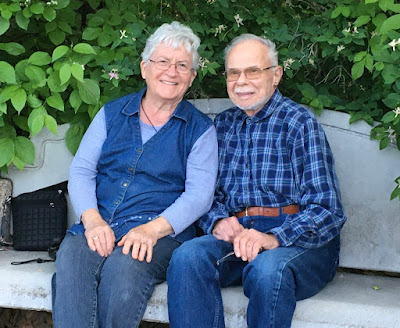I recently reconnected with a relative who is about my age (mid-60s).
A former member of the Mennonite Brethren conference, she wanted to catch up on life and talk about how her faith had changed—and about LGBTQ+.
I wasn’t sure what direction the conversation would take.
As it turned out, she has moved away from the more rigid, exclusionary and judgmental faith taught to her during her youth to a more generous and open view of God and God’s love for all humanity.
“Who am I to judge who Jesus should love and accept?” she said.
For her, that included LGBTQ+ people.
Like many who grew up in the church in the 1960s and 70s, she was taught that anyone who was homosexual was sinning and going to Hell.
But she no longer believes that.
For her, one turning point was a Lesbian couple who came to her church.
They were good people who came seeking support and prayer—which she and others were happy to provide, along with friendship.
Talking to her, I realized again that this isn't just a topic of interest to younger people. Many older members of the MB conference want to talk about LGBTQ+, too.
In their older years, they have adopted a more generous stance when it comes to who is in and who is out in the family of faith.
Or they are simply more open to exploring new ideas than people often give them credit for.
After my conversation with my relative, I had to wonder if MB conference leadership is simply out of step when it comes to being willing to talk about LGBTQ+.
Maybe they shouldn't be afraid of offending older members; maybe many of those older members are already way ahead of them when it comes to talking about this subject.
That's what an MB pastor friend found out when he spoke at a women's group at this church a few years ago.
When told the group of about 25 older women they could ask him anything, one woman asked about LGBTQ+.
Her granddaughter had just come out, but she didn't know where she could go to talk about it.
Four other women quickly added that was their experience, too, involving grandchildren, children or siblings.
It caused my pastor friend to realize their was a desire to talk about LGBTQ+, but no place in the church where people felt safe doing it.
This anecdotal evidence was corroborated by a 2021 survey of Canadian MB churches by the Mennonite Brethren Seminary.
When it asked churches if they are interested in talking about LGBTQ+, 88% said yes.
Despite this, the Canadian Conference of MB Churches, and some provincial conferences, are reluctant to open up the conversation. It’s a no-go zone for them.
The national conference turned down an opportunity a few years ago. That led to the creation of a Time to Listen, a member-led effort to give MB church members chances to hear stories from and about the LGBTQ+ community.
The one time the subject appeared in an official Mennonite Brethren publication--the book On Holy Ground--three pages about LGBTQ+ were censored and the original print run destroyed. .
(By-the-way, to date those three missing pages have been viewed over 4,600 times on this blog.)
But many people want to talk about it. Will the MB conference in Canada, and provincial conferences, create space to do so? And in a way that invites real dialogue and room for disagreement and different perspectives?
I hope so. But I'm not holding my breath. Maybe someone will have to take the initiative if leaders won't.
Anyone up for a challenge?
Maybe the result will be more placid than anyone realizes, like the photo above.







